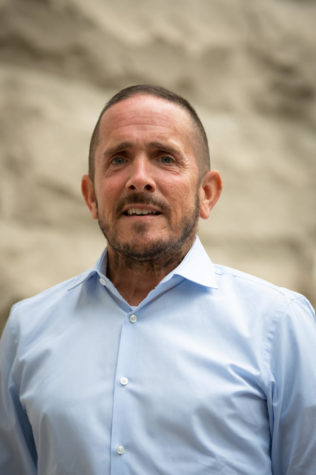New director discusses progress, challenges in admissions office

Shawn Abbott, Tulane University’s new dean of admissions, knows his field is not one many students aspire to join.
“You probably wouldn’t be surprised to find out that no one goes to college to become a dean of admissions,” Abbott said.
But despite the lack of prestige, the office plays an important role in determining the future of Tulane.
Abbott is all in.
“I love getting up every day and representing an institution that I love, representing a city that I love, and it’s even more exciting when I know that I can help students and families and counselors imagine their own college experience,” Abbott said.
Abbott has held leadership positions in admissions at universities for over 15 years, but does not seem jaded about his new job. He lauded what he views as Tulane’s unique aspects: “Students have a very shared undergraduate experience, more so than other places,” and also said Tulane is unique for having a flourishing athletic program in a major city.
Abbott is enthusiastic, he said, but he also acknowledged the challenges that his office and other admissions programs across the country face.
“We’re really worried in the moment about the impact the pandemic had on standards in individual high schools,” he said. “We’ve just now welcomed a collection of students that wasn’t as prepared as maybe the classes that arrived two and three years ago and that’s the reality of how we all navigated through that pandemic.”
One way that college admissions offices have traditionally looked at student preparedness was through standardized testing, which has been optional at Tulane since the 2021-2022 school year. Abbott said he does not “forecast in the immediate future that we’re going to go back to requiring the standardized tests.”
“As college universities became test optional, the volume of students from low-income backgrounds and particularly students of color have increased in individual applicant pools,” Abbott said. But “there’s also the question about whether or not students who are from incredibly privileged backgrounds and incredibly affluent backgrounds are now choosing not to take the test, and is that really helping or hurting the argument for access or equity? I think the jury is still out on that.”
Removing the requirement for standardized tests is not the only way that Tulane has sought to increase diversity. Abbott said the school has made “remarkable strides” to become more ethnically diverse. “It’s going to be the rare exception that I could point to of a college/university there’s going to be more geographical diversity … than Tulane,” he said.
One upcoming challenge Tulane could face this year is the Supreme Court’s ruling on an affirmative action case that will begin Oct. 31. Many expect the court to declare affirmative action — the process of considering race or ethnicity as a factor in admissions — unconstitutional.
Abbott said diversity will always be a priority at Tulane. But a strikedown of affirmative action would “make it much more difficult, not just for Tulane, but for every college university that currently employs affirmative action in their admission process to be prohibited from even considering race or ethnicity as one of many factors,” Abbott said.
Tulane also seeks to address socioeconomic diversity.
“Where we need to focus moving forward, is not just on ethnic and geographic diversity, but socioeconomic diversity,” Abbott said. “We do have ways to go to be seriously competitive with other peer institutions, and then also to do better by students from low-income backgrounds, and not just students from low-income backgrounds, but students from middle-income backgrounds.”
One way that the Office of Admissions is seeking to address that issue is by changing how they allocate scholarships.
Admissions is “reimagining how we use our merit scholarship budget, and perhaps shifting, as we have over the course of the last few years, more of the dollars that we allocate for merit scholarships towards students that need scholarships,” Abbott said.
That shift would differ from a previous policy in which merit scholarships were awarded solely off of academic merit.
Another challenge that Abbott and his team face is the anxiety caused by the college application process.
Abbott said the application process at universities has become more streamlined than ever, and reminded worried applicants that most American colleges and universities admit well over 50% of students.
“The idea that the college admission process is more complicated, or more difficult or more onerous than it was 10, 15, 20 years ago is largely exaggerated,” Abbott said. “It’s this hyper fixation and this obsession over a very, very small collection of colleges and universities.”
Tulane, he said, is admittedly one of them.
But among those top universities, Abbott voiced concern with a shift he said he is witnessing in American higher education: some students look at college as an educational experience. Others see it more like a luxury brand.
But he was hesitant to offer solutions with only a month on the job. It is a fair critique, he said, “that highly selective colleges and universities that have the financial resources to do so should really think about possibly increasing the size of their first-year classes to accommodate a hyper demand of what they’re offering.”
But for now, Abbott remains committed to Tulane’s goals.
“I’m here to carry out the vision,” he said.
Your donation will support the student journalists of Tulane University. Your contribution will allow us to purchase equipment and cover our annual website hosting costs.


